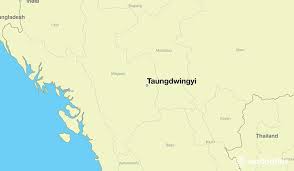Taungdwingyi
taungdwingyi
City scape
.jpg)
The town is divided into ten main quarters. They are Ohndaw Quarter 1, Ohndaw Quarter 2, Taungbyin Quarter 1, Taungbyin Quarter 2, Shwe-oh Quarter 1, Shwe-oh Quarter 2, Maungdaing Quarter 1, Maungdaing Quarter 2, Shwekya-in Quarter 1 and Shwekya-in Quarter 2. At the center of the town are the Myoma Zay central market, and the Independence Park. The Kandawgyi Lake, which used to be a weir in ancient times, is located on the east side of town, and is ringed by a number of historic Buddhist monasteries. Zeya Mingala Shweindaung is the most sacred pagoda in the township. The Aung Myin Zeya Rakhine Pagoda located at the western part of the town is the largest pagoda in the township. Once, it was in a state of decay and renovation was finished in 2013.
Economy
Economic of this town is based on agriculture and trading agricultural products. Onion, Rice, beans, grains, sugarcane are grown. Peanut oil is also a major product of the town.
Transportation
Taungdwingyi is connected to Magway (68 kilometres (42 mi)) to the West, Pyay (162 kilometres (101 mi)) to the South and Naypyidaw (68 kilometres (42 mi)) to the East, by means of territorial roads and railways. By the territorial roads, it is 227 kilometres (141 mi) to Mandalay and 365 kilometres (227 mi) to Yangon. The closest major airport to Taungdwingyi, Myanmar is Magwe Airport (MWQ).
History
The Taungdwingyi region is one of the earliest inhabited regions in Myanmar. The Pyu city of Beikthano was founded around 200 BCE.[1] Taungdwinggyi was a city state during Bagan Era. At the Mongol invasions, the city was destroyed by Mongol. In 1278, a relative of a Bagan King, Thiha Patae reestablished Taungdwingyi. In 1480, Ava King, Second Min Khaung sent Lord Zeya Kyaw Htin to administrate the town. During the Ava period (1364–1555), the region produced a number of famous poets and writers such as Shin Ohnnyo, Shin Khayma, Shin Uttama and Shin Maha Thilawuntha, Shin Nyeinme and Khingyi Phyaw.[citation needed]
Weather
April is warmest with an average temperature of 39 °C (102 °F) at noon. January is coldest with an average temperature of 14 °C (57 °F) at night. Temperatures drop sharply at night. January is on average the month with most sunshine. The wet season has a rainfall peak around August, the dry season is around the month of March.
Nature
Taungdwingyi has a humid (> 0.65 p/pet) climate. The climate is classified as a tropical monsoon (short dry season, monsoon rains other months), with a subtropical dry forest biozone . The soil in the area is high in nitosols, andosols (nt), soil with deep, clay-enriched lower horizon with shiny ped surfaces.
တောင်တွင်းကြီးမြို့
တောင်တွင်းကြီးမြို့သည် မကွေးတိုင်းဒေသကြီး၊ မကွေးခရိုင်၊ တောင်တွင်းကြီးမြို့နယ်၏ ရုံးစိုက်ရာမြို့ဖြစ်သည်။ တောင်တွင်းကြီးမြို့သည် မကွေးမြို့မှ အရှေ့ဘက် (၅၁)မိုင် ကွာဝေးသည်။ ပေလေးပင် သျှင်လေးပါး ပေါ်ထွန်းသောမြို့ဟု မြန်မာစာပေလောကတွင် ထင်ရှားကျော်စောသည်။ တောင်တွင်းကြီးမြို့နယ်သည် တြိဂံပုံသဏ္ဌာန်ရှိ၍ မြေဩဇာထက်သန်ကောင်းမွန်သော လွင်ပြင်ဒေသများရှိသောကြောင့် မကွေးခရိုင်တွင် စပါးအများဆုံး ထွက်သောမြို့နယ်ဖြစ်သည်။ လယ်ယာစိုက်ပျိုးခြင်းအတွက် ဆည်မြောင်းများ တူးဖော်လုပ်ကိုင်ကြရသည်။ ရှေးခေတ်က ဆည်မြောင်းအဟောင်းများကိုလည်း ယခုတိုင်တွေ့ရှိနိုင်သည်။ တောင်တွင်းကြီးမြို့ မြူနီစပယ်အဖွဲ့ကို ၁၈၈၇ ခုနှစ်မှစ၍ တည်ထောင်ခဲ့သည်။
မြို့တည်ပုံ
မြို့ကို ရပ်ကွက်ကြီး ၁၀ခုဖြင့် ဖွဲ့စည်းထားသည်။ ၎င်းတို့မှာ အုန်းတော-၁ ရပ်ကွက်၊ အုန်းတော-၂ ရပ်ကွက်၊ တောင်ပြင်-၁ ရပ်ကွက်၊ တောင်ပြင်-၂ ရပ်ကွက်၊ ရွှေအိုး-၁ ရပ်ကွက်၊ ရွှေအိုး-၂ ရပ်ကွက်၊ မောင်းတိုင်-၁ ရပ်ကွက်၊ မောင်းတိုင်-၂ ရပ်ကွက်၊ ရွှေကြာအင်း-၁ ရပ်ကွက်၊ ရွှေကြာအင်း-၂ ရပ်ကွက် တို့ဖြစ်ကြသည်။ မြို့လည်တွင် မြို့မဈေးကြီးနှင့် လွတ်လပ်ရေးပန်းခြံ တည်ရှိသည်။ မြို့၏ အရှေ့အရပ်တွင် ရတနာပွင့်လှ ကန်တော်ကြီး တည်ရှိသည်။ ၎င်း ကန်တော်ကြီးသည် ပုဂံခေတ်ကာလတည်းက ရေသွင်းစိုက်ပျိုးရေးအတွက် အသုံးပြုခဲ့သော တစ်ဘက်ဆည်ကန်မျိုးဖြစ်သည်။ မြို့၏ မြောက်ဘက်ခြမ်းတွင် ဇေယျမင်္ဂလာရွှေအင်းတောင် စေတီရှိသည်။ မြို့၏ အနောက်ဘက်ခြမ်းတွင် ထုထည်ကြီးမားသည့် အောင်မြင်ဇေယျရခိုင်စေတီရှိသည်။ တစ်ချိန်က ပျက်စီးယိုယွင်းနေသည့် မြေစိုင်တောင်ကုန်းပညာ စေတီပျက်ကြီးဖြစ်ပြီး ၂၀၀၃ ခုနှစ်တွင် ပြန်လည်ပြုပြင် ပြီးစီးခဲ့သည်။ ၂၀၁၃ တွင် ထီးတော်တင်ပြီးစီးခဲ့သည်။
ပို့ဆောင်ဆက်သွယ်ရေး
တောင်တွင်းကြီးမြို့သည် အနောက်ဘက်တွင် မကွေးမြို့သို့ ၈၂ ကီလိုမီတာ(၅၁ မိုင်) ရှည် ကားလမ်းဖြင့်လည်းကောင်း၊ တောင်ဘက်တွင် ပြည်မြို့သို့ ၁၆၂ ကီလိုမီတာ(၁၀၁ မိုင်)ရှည်ကားလမ်းဖြင့်လည်းကောင်း၊ အရှေ့ဘက်တွင် နေပြည်တော်နှင့် ပျဉ်းမနားမြို့သို့ ၆၈ ကီလိုမီတာ(၄၂ မိုင်)ရှည် ကားလမ်းဖြင့်လည်းကောင်း၊ မြောက်ဘက်တွင် မြို့သစ်မြို့သို့ ၂၉ ကီလိုမီတာ(၁၈ မိုင်) ရှည်ကားလမ်းဖြင့်လည်းကောင်း ဆက်သွယ်ထားသည်။ ကားလမ်းခရီးဖြင့် ရန်ကုန်-နေပြည်တော်လမ်းမကြီးမှတဆင့် ရန်ကုန်မြို့သို့ ၄၇၅ ကီလိုမီတာ(၂၉၀ မိုင်) ခရီးအား ၇ နာရီ ခန့်မောင်းနှင်သွားရောက်နိုင်သည်။ မန္တလေးမြို့သို့ မန္တလေး-နေပြည်တော်လမ်းမကြီးမှတဆင့် ၂၇၇ ကီလိုမီတာ(၁၇၂ မိုင်) ခရီးအား ၄ နာရီခွဲခန့် မောင်းနှင်၍ သွားရောက်နိုင်သည်။ ထိုပြင် ပျဉ်းမနား-ကျောက်ပန်းတောင်း မီးရထားလမ်းသည် တောင်တွင်းကြီးမြို့ကို ဖြတ်၍သွားလေသည်။ မကွေးမြို့သို့လည်း မီးရထားလမ်း ရှိသည်။
သမိုင်းကြောင်း
တောင်တွင်းကြီးမြို့ကို ကာလိင်္ကရာဇ်မင်းက ၁ ရက်၊ ဧပြီ၊ ၈၃၀ ခုနှစ်တွင် စတင်တည်ထောင်ခဲ့သည်။ ထိုစဉ်က တောင်တွင်းကြီးသည် တောင်တွင်းမင်းများ အုပ်ချုပ်ခဲ့ရာ မင်းနေပြည်တော် ဖြစ်ခဲ့သည်။ သို့သော် တောင်တွင်းမင်း ဇေယျသူလက်ထက်တွင် ပုဂံဘုရင် နရသီဟပတေ့အား မွန်ဂိုတပ်များ ဝင်ရောက်တိုက်ခိုက်စဉ် တောင်တွင်းကြီးမြို့ပျက်စီးခဲ့ရသည်။
ခရစ်နှစ် ၁၂၇၈ တွင် ပုဂံ ကျော်စွာဘုရင်၏ အဆက်အနွယ်မှ သီဟပတေ့ဆိုသူက တောင်တွင်းမြို့ကို ပြန်လည်တည်ထောင်ခဲ့သည်။ ၁၄၈၁ ခုနှစ် အင်းဝဘုရင် ဒုတိယမင်းခေါင်လက်ထက်တွင် ဇေယျကျော်ထင်ကို တောင်တွင်းကြီးမြို့ ဘုရင်ခံရာထူး ခန့်အပ်ခဲ့သည်။ ၁၆၀၆ ခုနှစ်၊ အနောက်ဘက်လွန်မင်း နန်းတက်စတွင် သားတော် မဟာဇေတရာဇ်အား တောင်တွင်းကြီးမြို့ ပြည်စိုးအရာ ခန့်အပ်ခဲ့သည်။
ညောင်ရမ်းခေတ်နှောင်းကာလတွင် ပြည်စိုးအစား မြို့သူကြီးများ ခန့်အပ်ခဲ့သည်။ မဟာဓမ္မရာဇာမင်းနှင့် ကုန်းဘောင်ခေတ်ဦးကာလ အလောင်းမင်းတရားတို့၏ လက်ထက်တို့တွင် တောင်တွင်းကြီးကို မြို့သူကြီး ဦးကြွက်ဖြူက အုပ်ချုပ်ခဲ့သည်။ ဦးကြွက်ဖြူသည် ဇေယျဝဍ္ဎန နှင့် ဇေယျနန္ဒရာဇာဘွဲ့များ ရရှိခဲ့သူဖြစ်သည်။ ကန်တော်မင်းကျောင်းဆရာတော်အား ၁၇၅၃ ခုနှစ်တွင် မေတ္တာစာရေးဖွဲ့ရန် လျှောက်ထားခဲ့သူလည်း ဖြစ်သည်။
ဘိုးတော်ဘုရားလက်ထက် ၁၇၈၃ ခုနှစ်တွင် တောင်တွင်းကြီးမြို့စစ်တမ်းကို မြို့သူကြီး ဦးရန်ကင်းက ဆက်သွင်းခဲ့သည်။ ယင်းနောက် သားဖြစ်သူ ဦးအိုက မြို့သူကြီးအဖြစ် ဆက်ခံခဲ့သည်။ မြို့သူကြီးဦးအိုလက်ထက်တွင် အုပ်ချုပ်ရေးညံ့ဖျင်းမှုကြောင့် ဦးရွှေရန်အား အစားထိုးခန့်ထားခဲ့သည်။ မြို့သူကြီး ဦးရွှေရန်သည် ၁၈၁၄ ခုနှစ်တွင် အုတ်ကျောင်းဆရာတော်အား တောင်တွင်းကြီးမြို့သမိုင်း ရေးသားပြုစုပေးရန် လျှောက်ထားခဲ့သည်။ [၂]
စီးပွားရေး
တောင်တွင်းကြီးမြို့သည် လယ်ယာစိုက်ပျိုးလုပ်ငန်းကို အခြေပြုသော မြို့ဖြစ်သည်။ မြို့နယ်တွင်း စိုက်ပျိုးရန် ကျယ်ပြန့်သော လွင်ပြင်များရှိပြီး အရှေ့ပဲခူးရိုးမမှ စီးဆင်းလာသောရေများကို ဆည်ဖို့၍ ရေသွင်းစိုက်ပျိုးရေးကို လုပ်ကိုင်သည်။ တောင်ကျခေျာင်းများသဲခုံများပေါ်တွင် ကြက်သွန်နီ စိုက်ပျိုးရေးလုပ်ငန်းကို အကြီးအကျယ် လုပ်ကိုင်သည်။ အဓိက ထွက်ကုန်များမှာ ဆန်၊ ပဲအမျိုးမျိုး၊ ပြောင်း၊ နှမ်း၊ ကြံ နှင့် စားသုံးဆီအမျိုးမျိုးတို့ ဖြစ်သည်။ တစ်ချိန်က သစ်လုပ်ငန်း အကြီးအကျယ် ဖြစ်ထွန်းခဲ့သော်လည်း ယခုအခါ သစ်ဝါးများ ရှားပါးကုန်၍ သစ်လုပ်ငန်း ကျဆင်းသွားခဲ့သည်။
ရာသီဥတု
ဧပြီလသည် အပူဆုံးလဖြစ်ပြီး နေ့ခင်းအချိန်များတွင် ပျမ်းမျှ အပူဆုံးမှာ ၄၀° စင်တီဂရိတ်အထိ ရှိတတ်သည်။ အအေးဆုံးလမှ ဇန်နဝါရီလဖြစ်၍ ပျမ်းမျှအအေးဆုံးမှာ ၁၄° စင်တီဂရိတ်ထိ အေးတတ်သည်။ ညအချိန်တွက် အပူချိန် လွန်ကဲစွာ ကျဆင်းလေ့ရှိသည်။ မိုးရာသီတွင် ဩဂုတ်လ၌ မိုးအများဆုံး ရွာသွန်းသည်။